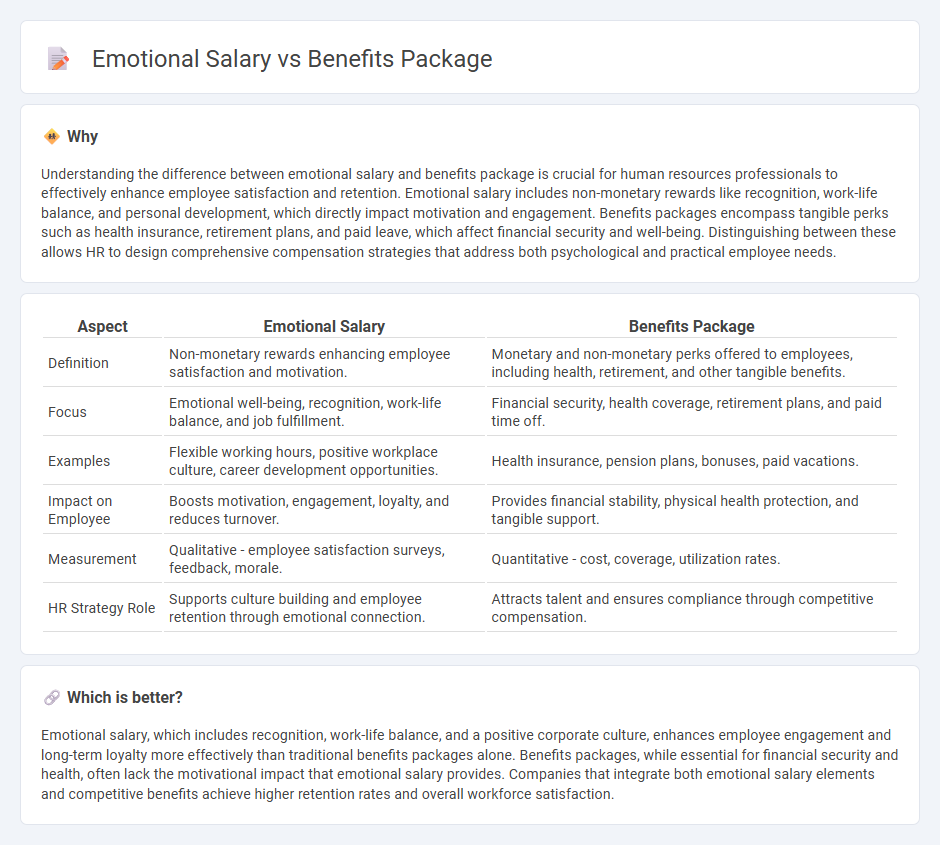
Emotional salary encompasses the non-monetary rewards employees receive, such as recognition, work-life balance, and meaningful work, which significantly impact job satisfaction and retention. In contrast, a benefits package includes tangible compensation elements like health insurance, retirement plans, and paid leave that provide financial security. Explore how integrating emotional salary with robust benefits packages can enhance overall employee engagement and organizational success.
Why it is important
Understanding the difference between emotional salary and benefits package is crucial for human resources professionals to effectively enhance employee satisfaction and retention. Emotional salary includes non-monetary rewards like recognition, work-life balance, and personal development, which directly impact motivation and engagement. Benefits packages encompass tangible perks such as health insurance, retirement plans, and paid leave, which affect financial security and well-being. Distinguishing between these allows HR to design comprehensive compensation strategies that address both psychological and practical employee needs.
Comparison Table
| Aspect | Emotional Salary | Benefits Package |
|---|---|---|
| Definition | Non-monetary rewards enhancing employee satisfaction and motivation. | Monetary and non-monetary perks offered to employees, including health, retirement, and other tangible benefits. |
| Focus | Emotional well-being, recognition, work-life balance, and job fulfillment. | Financial security, health coverage, retirement plans, and paid time off. |
| Examples | Flexible working hours, positive workplace culture, career development opportunities. | Health insurance, pension plans, bonuses, paid vacations. |
| Impact on Employee | Boosts motivation, engagement, loyalty, and reduces turnover. | Provides financial stability, physical health protection, and tangible support. |
| Measurement | Qualitative - employee satisfaction surveys, feedback, morale. | Quantitative - cost, coverage, utilization rates. |
| HR Strategy Role | Supports culture building and employee retention through emotional connection. | Attracts talent and ensures compliance through competitive compensation. |
Which is better?
Emotional salary, which includes recognition, work-life balance, and a positive corporate culture, enhances employee engagement and long-term loyalty more effectively than traditional benefits packages alone. Benefits packages, while essential for financial security and health, often lack the motivational impact that emotional salary provides. Companies that integrate both emotional salary elements and competitive benefits achieve higher retention rates and overall workforce satisfaction.
Connection
Emotional salary enhances employee satisfaction by addressing non-monetary needs such as recognition, work-life balance, and job purpose, which complements traditional benefits packages focused on financial compensation and health coverage. Integrating emotional salary with comprehensive benefits fosters higher employee engagement, reduces turnover rates, and improves overall organizational performance. Companies investing in both aspects create a holistic human resources strategy that supports well-being and motivation.
Key Terms
Health Insurance
Health Insurance as part of a benefits package offers tangible financial protection through coverage of medical expenses, contributing to employee well-being and reduced out-of-pocket costs. Emotional salary, by contrast, enhances employee satisfaction by providing health-related perks that improve perceived value and workplace morale but may lack direct financial reimbursement. Discover how integrating health insurance into both benefits packages and emotional salary strategies can optimize employee retention and productivity.
Work-Life Balance
A comprehensive benefits package typically includes health insurance, retirement plans, and paid time off, directly enhancing employees' financial security and physical well-being. Emotional salary, emphasizing work-life balance, encompasses non-monetary rewards such as flexible work hours, recognition, and a supportive workplace culture that boosts job satisfaction and mental health. Explore how integrating both tangible benefits and emotional salary components can create a more fulfilling work environment.
Recognition
A benefits package typically includes tangible rewards such as health insurance, retirement plans, and paid time off, while emotional salary emphasizes non-monetary recognition, fostering a sense of appreciation and belonging. Recognition as part of emotional salary enhances employee motivation, engagement, and loyalty, complementing traditional benefits by addressing psychological needs. Discover how integrating recognition into your rewards strategy can transform workplace culture and boost performance.
Source and External Links
Employee Benefits Package: Definitions, Types and Tips | Indeed.com - Benefits packages provide additional perks beyond salary, typically including health insurance, dental and vision insurance, and sometimes health flexible spending accounts to reduce out-of-pocket medical costs for employees and their families.
Understanding Your Benefits Package: What to Look For and Consider - A benefits package offers various services like insurance, paid time off, and retirement programs, giving employees control over aspects of their compensation beyond salary and helping them plan for future financial and health security.
What Is Included in an Employee Benefit Package? - Employee benefits packages typically cover medical insurance, paid time off, dental insurance, life insurance, and retirement savings such as 401(k) plans, with medical coverage being essential due to its role in reducing financial stress related to healthcare expenses.
 dowidth.com
dowidth.com